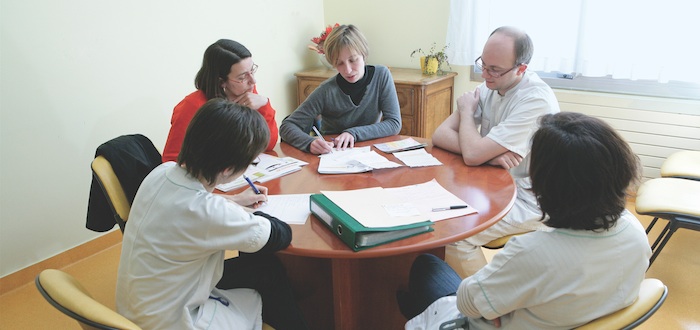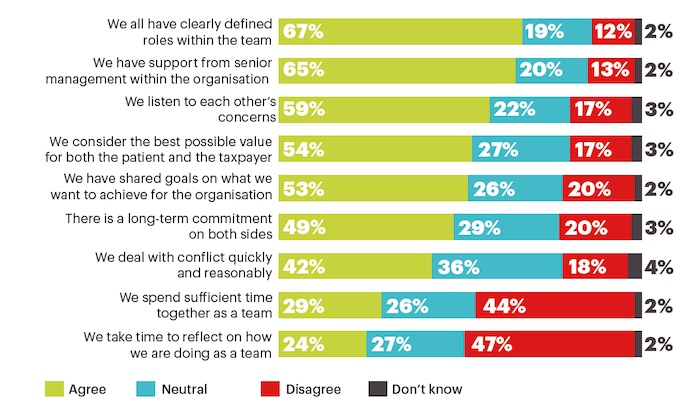
It is received wisdom in parts of the NHS that financial and clinical staff are different breeds, with the distinct professional focus and specialised jargon of each meaning they inhabit separate worlds that overlap only intermittently – and only when absolutely necessary.
But an Ipsos Mori survey commissioned by an action area of Future-Focused Finance – Close Partnering, which aims to improve teamworking across professional boundaries in the NHS – reveals a healthy level of engagement between clinicians and finance staff, and a reasonable understanding of each other’s professional priorities.
For example, 59% of survey respondents said they listened to each other’s concerns, 54% said they considered the best possible value for both taxpayers and patients, and 53% said they have shared goals on what they want to achieve for the organisation.
These findings back up anecdotal evidence that, in many organisations and many clinical and finance departments, staff report excellent working relationships and teamworking across boundaries. Unfortunately, this does not apply across the NHS, and a substantial minority of the sample were less positive.
Fewer than half (42%) of staff felt they dealt with conflict quickly and reasonably, with fewer than one third (29%) agreeing they spent sufficient time together as a team, and even fewer (24%) taking time to reflect on how they were doing as a team.

The survey considered dimensions of the relationships between clinical and finance staff as well as aspects of interdepartmental teamworking to identify factors that can influence decision-making in the NHS and also the effect on patient outcomes.
Clinicians have a major influence over spending in the NHS. The sponsors of FFF – the chief finance officers of the main NHS organisations – found welcome allies recently in the Academy of Medical Royal Colleges, through their report Decisions of value, which articulated the ethical duty of clinicians to consider the best value in clinical practice for patients overall as well as individually.
Cross-boundary teamworking is a major theme in the work of professor Michael West of The King’s Fund, who has spent much of his recent career considering this, particularly in the health service. Commissioned by the FFF Close Partnering action area, professor West and The King’s Fund set out to develop a toolkit for NHS bodies to assess the health of working relationships across their organisation, and to identify priorities for development.
As West explains: “Healthy working relationships are critical to an organisation’s ability to create a culture in which organisational teamwork can thrive, in order to deliver better patient care within the resources available.”
The result, Crossing professional boundaries – a King’s Fund toolkit for collaborative teamwork, specifically addresses the challenge of getting clinical staff and financial and management staff to work together to address common difficulties in the NHS, notably the financial implications of rising demands for services and for higher quality.
The toolkit is designed to encourage finance and clinical staff to think as a team about how they work across professional boundaries. It provides a step-by-step guide to enable one group to reflect upon the other’s point of view.
“Most teams in the NHS – at all levels – do not take the time to stop and reflect,” says Dr Sanjay Agrawal, a consultant at University of Leicester Hospitals and the FFF lead for Close Partnering. “It’s seen as a luxury. We’re saying it’s not a luxury. It’s an essential, basic requirement of well-functioning teams, especially when members come from very different professional backgrounds.
“It may not sound ground-breaking. It may not sound like you need a toolkit to help you do it. But the reality is that taking the time to stop and reflect on the way you work as a team is a powerful tool for improvement. The best teams do it all the time.”
The toolkit has undergone rigorous testing – 22 NHS organisations in England piloted it, including acute, community and mental heath trusts as well as clinical commissioning groups – to ensure that it works in a variety of environments. It has been adapted to take account of feedback from this phase, and the result is due to be launched for widespread use in early 2016.
Encouragingly, the pilot schemes found the toolkit has a significant impact on clinical engagement and cross-departmental teamworking. It encourages clinical and financial leaders to pair up and take the initiative to improve working relationships, and to work through the approach together.
The pilots also identified some barriers to getting teams to get to grips with the toolkit, and to make sure they set aside time.
Judith Muir, a matron at Gloucestershire Hospitals NHS Foundation Trust, worked with senior service improvement accountant Robert Neale.
Neale says: “Our clinicians reported that 80% met with finance monthly or more frequently and 84% have dedicated support from a member of the finance team. While 56% rate their understanding of NHS finance as either good or very good, there is more we can do to improve this.”
For Muir, there were some challenges: “Getting clinical staff to take 2-3 hours out to reflect is always going to be difficult,” she observes. “People can always find something more urgent to do. So we adapted the approach to enable people to complete the questionnaire, then fed back to larger groups.”
Reactions to the terminology used varied; for example many found the term “reflexivity” off-putting, while “toolkit” was found to be understandable and straightforward.
“The toolkit has allowed us to reflect on the jargon that each of us uses in our daily work,” Muir adds. “Our finance staff have certainly got better at avoiding jargon and explaining things in more user-friendly language. It’s made communications better between professional groups.”
Ultimately, the proof of the pudding will be if the toolkit leads to cost-effective improvements in care. While it is early days, Muir believes the toolkit has allowed her to make an immediate impact. “Because we now understand each other better, I was able to work with my finance colleagues to justify the investment in some equipment which considerably improved the patient experience and shortened their length of stay,” she says.
David Sproson, head of finance at Mersey Care NHS Trust, another pilot site, has also seen improvements. “Though we had some areas of good teamworking across boundaries, we found the toolkit helped us improve working relationships and clinical engagement, which is to the benefit of our patients,” he says.



















